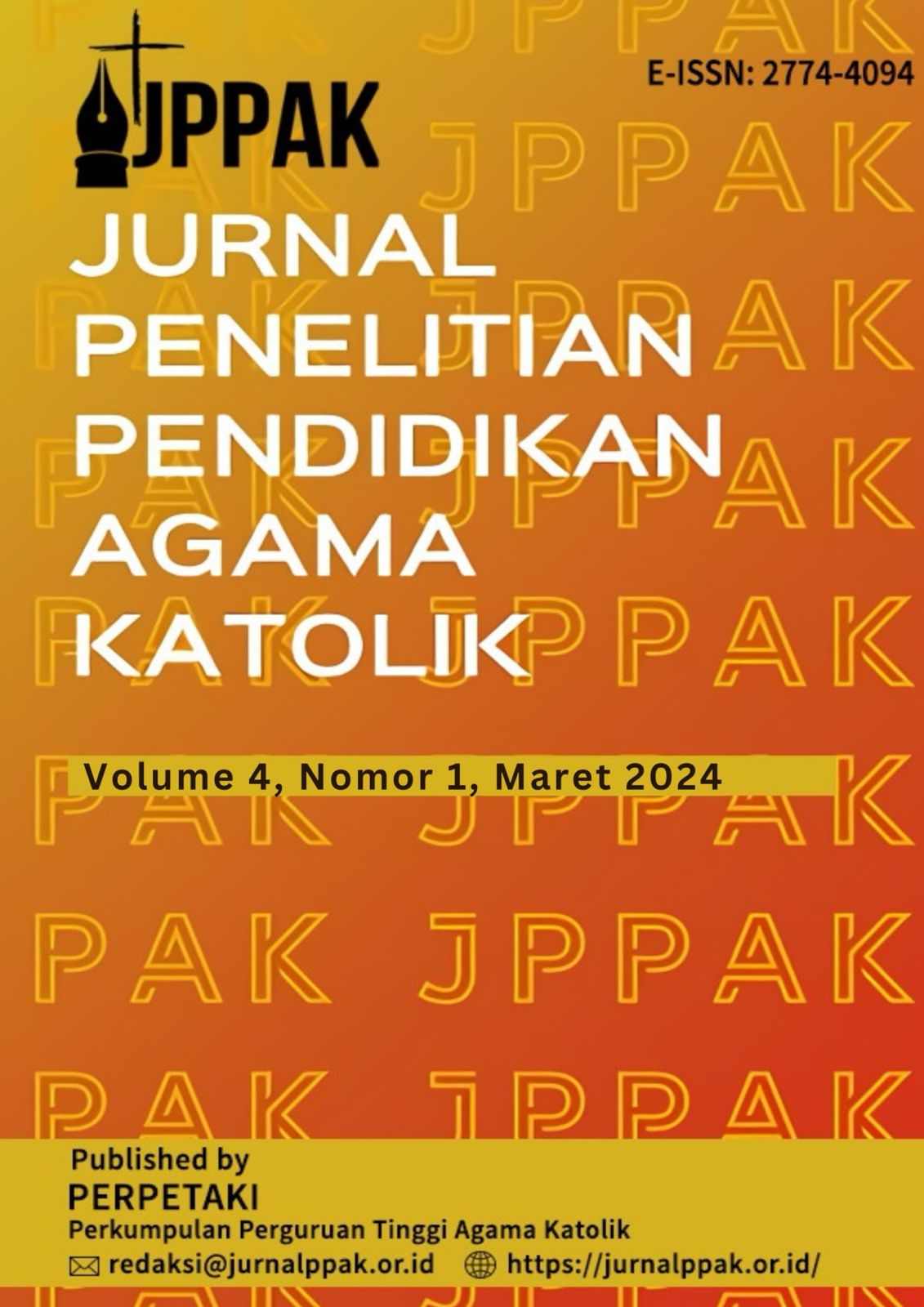Peran Kreativitas dalam Penggunaan Media Alat Peraga dan Teknik Berhomili di Stasi Santo Bonaventura Situnggaling, Paroki Santo Fransiskus Asisi Saribudolok
DOI:
https://doi.org/10.52110/jppak.v4i1.115Keywords:
Creativity of Church Administrators, Media Props, HomiliesAbstract
The creativity of church administrators in homily in Stasi Santo
Bonaventura Situnggaling Paroki Santo Fransiskus Asisi
Saribudolog became the orientation or concern in this research
because the Medan Archdiocese Church tried to educate the laity
through pastoral functionaries taking an active part, especially in
leading the celebration of the word on Sundays without faith and
giving homilies. This approach uses three techniques, including
interviews with informants directly with listening techniques, data
collection through observation, and supporting documents as part
of the documentation. The stages of data analysis began with
data reduction, displaying data, and testing the truth of the data
by triangulating techniques and sources. Efforts made with this
approach found two essential aspects of the creativity of Church
administrators in domicile, which are used as findings: (1) Church
administrators have creativity in presenting homilies, especially
the use of props, although not yet optimal, body language: facial
expressions, body gestures, voice intonation and dialogue
contact with the congregation. (2) Homilies bear fruit for the
faithful in this parish, such as churchgoers who experience a deep
understanding of the meaning of the word of God for life,
experience the presence of God in life now, and change life in true
repentance. People feel prosperity in life. However, many people
in this Stasi still have not been able to make homilies good fruits
in their daily lives.
Downloads
##submission.downloads##
Submitted
Accepted
Published
How to Cite
Issue
Section
License
Copyright (c) 2024 Thomas N. Tarigan, Paulinus Tibo, Livo Novita Gurnin, Ona Sastri Lumban Tobing

This work is licensed under a Creative Commons Attribution-ShareAlike 4.0 International License.
Copyright Notice and Permissions
Jurnal Penelitian Pendidikan Agama Katolik offers immediate open access to all its content on the principle to make researches freely available to the public, especially to the scholars, to support greater global exchanges of knowledge. This journal encourages all scholarly authors to allow their research openly available, free access and without time restrictions.
All articles published Open Access will be immediately and permanently free for everyone to read and download. Under the CC BY-SA 4.0 license, authors retain ownership of the copyright for their article, however authors grant others permission to use the content of publications in Jurnal Penelitian Pendidikan Agama Katolik (JPPAK) in whole or in part provided that the original work is properly cited. Users (redistributors) of Jurnal Penelitian Pendidikan Agama Katolik (JPPAK) are required to cite the original source by including at least: the full title of the article, the author's or authors' full name(s), JPPAK as the initial source of publication, year of publication and volume number using a propriate citing method.
Copyright encompasses exclusive rights to reproduce and deliver the article in all form and media, including reprints, photographs, microfilms and any other similar reproductions, as well as translations. The reproduction of any part of this journal, its storage in databases and its transmission by any form or media, such as electronic, electrostatic and mechanical copies, photocopies, recordings, magnetic media is prohibited without consent of Jurnal Penelitian Pendidikan Agama Katolik (JPPAK).
Jurnal Penelitian Pendidikan Agama Katolik (JPPAK) is licensed under a Creative Commons Attribution Share-Alike 4.0 International. (CC BY-SA 4.0)
Authors who publish with Jurnal Penelitian Pendidikan Agama Katolik (JPPAK) agree to the following terms:
- Authors retain copyright and grant the journal right of first publication with the work simultaneously licensed under a Creative Commons Attribution Share-Alike 4.0 International (CC BY-SA 4.0) license that allows others to share the work with an acknowledgement of the work's authorship and initial publication in this journal.
- Authors are able to enter into separate, additional contractual arrangements for the non-exclusive distribution of the journal's published version of the work (e.g., post it to an institutional repository or publish it in a book), with an acknowledgement of its initial publication in this journal.
- Authors are permitted and encouraged to post their work online (e.g., in institutional repositories or on their website) after the publication on JPPAK, as long as it not published on other OJS for it will be treated as plagiarism by plagiarism checker apps. It can lead to productive exchanges, as well as earlier and greater citation of published work (See The Effect of Open Access).












